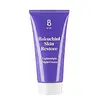What's inside
What's inside
 Key Ingredients
Key Ingredients

 Benefits
Benefits

 Concerns
Concerns

 Ingredients Side-by-side
Ingredients Side-by-side

Water
Skin ConditioningSimmondsia Chinensis Seed Oil
EmollientGlycerin
HumectantCaprylic/Capric Triglyceride
MaskingGlyceryl Stearate
EmollientBehenyl Alcohol
EmollientDicaprylyl Carbonate
EmollientIsoamyl Laurate
EmollientRosa Damascena Flower Water
MaskingHippophae Rhamnoides Fruit Extract
Skin ConditioningSodium PCA
HumectantSodium Levulinate
Skin ConditioningAroma
Cetearyl Alcohol
EmollientLecithin
EmollientCellulose
AbsorbentSodium Anisate
AntimicrobialPalmitic Acid
EmollientStearic Acid
CleansingLactic Acid
BufferingGlycine Soja Sterols
EmollientLinum Usitatissimum Seed Extract
PerfumingUrtica Dioica Leaf Extract
Skin ConditioningXanthan Gum
EmulsifyingPaeonia Lactiflora Root Extract
Skin ConditioningSodium Hyaluronate
HumectantSodium Phytate
Ascorbyl Palmitate
AntioxidantHydrolyzed Hyaluronic Acid
HumectantTocopherol
AntioxidantCI 77491
Cosmetic ColorantCitronellol
PerfumingGeraniol
PerfumingBenzyl Salicylate
PerfumingEugenol
PerfumingWater, Simmondsia Chinensis Seed Oil, Glycerin, Caprylic/Capric Triglyceride, Glyceryl Stearate, Behenyl Alcohol, Dicaprylyl Carbonate, Isoamyl Laurate, Rosa Damascena Flower Water, Hippophae Rhamnoides Fruit Extract, Sodium PCA, Sodium Levulinate, Aroma, Cetearyl Alcohol, Lecithin, Cellulose, Sodium Anisate, Palmitic Acid, Stearic Acid, Lactic Acid, Glycine Soja Sterols, Linum Usitatissimum Seed Extract, Urtica Dioica Leaf Extract, Xanthan Gum, Paeonia Lactiflora Root Extract, Sodium Hyaluronate, Sodium Phytate, Ascorbyl Palmitate, Hydrolyzed Hyaluronic Acid, Tocopherol, CI 77491, Citronellol, Geraniol, Benzyl Salicylate, Eugenol
Aloe Barbadensis Leaf Juice
Skin ConditioningVitis Vinifera Seed Oil
EmollientButyrospermum Parkii Butter
Skin ConditioningCetyl Alcohol
EmollientPropanediol
SolventGlyceryl Stearate
EmollientWater
Skin ConditioningCandelilla/Jojoba/Rice Bran Polyglyceryl-3 Esters
EmulsifyingBakuchiol
AntimicrobialXanthan Gum
EmulsifyingCetearyl Alcohol
EmollientSodium Stearoyl Lactylate
EmulsifyingBenzyl Alcohol
PerfumingCaprylic Acid
CleansingXylitol
HumectantTocopherol
AntioxidantLavandula Angustifolia Flower Oil
MaskingLinalool
PerfumingPhytic Acid
Limonene
PerfumingGeraniol
PerfumingAloe Barbadensis Leaf Juice, Vitis Vinifera Seed Oil, Butyrospermum Parkii Butter, Cetyl Alcohol, Propanediol, Glyceryl Stearate, Water, Candelilla/Jojoba/Rice Bran Polyglyceryl-3 Esters, Bakuchiol, Xanthan Gum, Cetearyl Alcohol, Sodium Stearoyl Lactylate, Benzyl Alcohol, Caprylic Acid, Xylitol, Tocopherol, Lavandula Angustifolia Flower Oil, Linalool, Phytic Acid, Limonene, Geraniol
Ingredients Explained
These ingredients are found in both products.
Ingredients higher up in an ingredient list are typically present in a larger amount.
Cetearyl alcohol is a mixture of two fatty alcohols: cetyl alcohol and stearyl alcohol. It is mainly used as an emulsifier. Emulsifiers help prevent the separation of oils and products. Due to its composition, it can also be used to thicken a product or help create foam.
Cetearyl alcohol is an emollient. Emollients help soothe and hydrate the skin by trapping moisture.
Studies show Cetearyl alcohol is non-toxic and non-irritating. The FDA allows products labeled "alcohol-free" to have fatty alcohols.
This ingredient is usually derived from plant oils such as palm, vegetable, or coconut oils. There is debate on whether this ingredient will cause acne.
Due to the fatty acid base, this ingredient may not be Malassezia folliculitis safe.
Learn more about Cetearyl AlcoholGeraniol is used to add fragrance/parfum to a product. It is the main component of citronellol. It is a monoterpenoid and an alcohol.
Monoterpenes are naturally found in many parts of different plants.
Geraniol can be found in many essential oils including Rose Oil and Citronella Oil. The scent of Geraniol is often described as "rose-like". Many foods also contain Geraniol for fruit flavoring.
Geraniol can irritate the skin when exposed to air. However, irritation depends on the ability of geraniol to penetrate into the skin. In general, geraniol is not able to penetrate skin easily.
Geraniol is colorless and has low water-solubility. However, it is soluble in common organic solvents.
Like citronellol, it is a natural insect repellent.
2,6-Octadien-1-ol, 3,7-dimethyl-, (2E)-
Learn more about GeraniolGlyceryl Stearate is a mix of glycerin and stearic acid.
It is used to stabilize the mixing of water and oil ingredients. By preventing these ingredients from separating, it can help elongate shelf life. It can also help thicken the product's texture.
As an emollient, it helps soften skin and supports barrier-replenishing ingredients.
In cosmetics, Glyceryl Stearate is often made from vegetable oils or synthetically produced.
This ingredient may not be fungal-acne safe
Fun fact: The human body also creates Glyceryl Stearate naturally.
Learn more about Glyceryl StearateTocopherol (also known as Vitamin E) is a common antioxidant used to help protect the skin from free-radicals and strengthen the skin barrier. It's also fat soluble - this means our skin is great at absorbing it.
Vitamin E also helps keep your natural skin lipids healthy. Your lipid skin barrier naturally consists of lipids, ceramides, and fatty acids. Vitamin E offers extra protection for your skin’s lipid barrier, keeping your skin healthy and nourished.
Another benefit is a bit of UV protection. Vitamin E helps reduce the damage caused by UVB rays. (It should not replace your sunscreen). Combining it with Vitamin C can decrease sunburned cells and hyperpigmentation after UV exposure.
You might have noticed Vitamin E + C often paired together. This is because it is great at stabilizing Vitamin C. Using the two together helps increase the effectiveness of both ingredients.
There are often claims that Vitamin E can reduce/prevent scarring, but these claims haven't been confirmed by scientific research.
Learn more about TocopherolWater. It's the most common cosmetic ingredient of all. You'll usually see it at the top of ingredient lists, meaning that it makes up the largest part of the product.
So why is it so popular? Water most often acts as a solvent - this means that it helps dissolve other ingredients into the formulation.
You'll also recognize water as that liquid we all need to stay alive. If you see this, drink a glass of water. Stay hydrated!
Learn more about WaterXanthan gum is used as a stabilizer and thickener within cosmetic products. It helps give products a sticky, thick feeling - preventing them from being too runny.
On the technical side of things, xanthan gum is a polysaccharide - a combination consisting of multiple sugar molecules bonded together.
Xanthan gum is a pretty common and great ingredient. It is a natural, non-toxic, non-irritating ingredient that is also commonly used in food products.
Learn more about Xanthan Gum